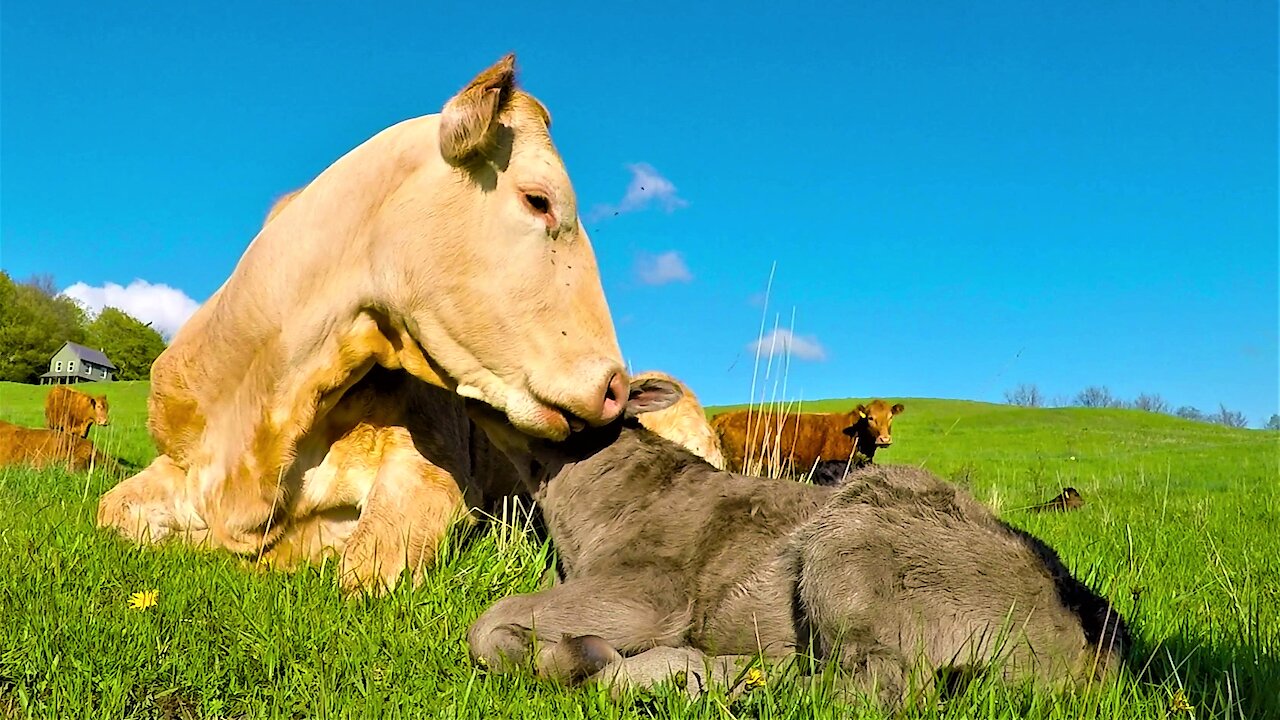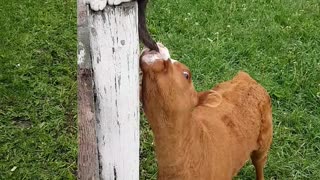Premium Only Content

Newborn calf struggles to stay awake in the sunshine
Velvet is a sleepy little calf who was just born one week ago on a beautiful farm in Millbrook, Ontario. She has been following her mother, Nora around the meadow, nursing happily, playing with the other calves and sleeping in the sunshine. This farm has acres of lush, green meadow to wander freely over and there are ponds full of fresh water. The pastures are bordered by a mature forest and life couldn't be much better for these gentle creatures. Things here are as close to what nature intended as possible.
Velvet will continue to stay close to her mother for many months as she nurses on milk and learns how to be a cow by watching the herd closely. Nora is enjoying a quiet afternoon in the sun, chewing her cud and resting. She will need to eat almost constantly to keep up her milk supply for velvet and to keep strong herself. Although Velvet will soon learn to graze, imitating her mother, she will not be able to digest grass well for several months. She will start to eat more grass as time goes on. She is awkward and clumsy now, but through running and playing, she will strengthen her legs and develop better coordination.
Calves are able to stand within an hour or so of birth. In nature, they need to be able to move immediately to follow the herd in the search for food and to avoid predators.
Velvet's father, Gus is a strapping young bull who wanders these meadows as well. Weighing over 2,000 pounds, he walks confidently around this farm, keeping a watchful eye over the herd. The calves have little to fear with him around.
With the increasing demand for farmers to produce food at lower prices, many have turned to mass production methods, being forced to cut corners. But many farmers, such as these, have stuck to more traditional methods such as free range grazing in meadows. These farmers refuse to produce veal and they value herd health and happiness as much as profit. Although food produced in this way costs more, it is well worth it to support those farmers who are still doing things right. They are known as "ethical farms" and they can easily be found in most communities.
-
 1:45
1:45
WildCreatures
26 days ago $1.10 earnedGiant manta rays surround scuba divers in Galapagos Islands
3.17K2 -
 0:30
0:30
ViralHog
2 years ago $0.04 earnedTired Kitty Struggles to Stay Awake
2161 -
 0:13
0:13
ViralHog
2 years ago $0.04 earnedBaby Jax Struggles to Stay Awake in Rocker
183 -
 1:34
1:34
WildCreatures
3 years ago $2.25 earnedMother cow & newborn calf happily greet visitor in their meadow
8.19K18 -
 0:47
0:47
BlackDogFarmAndRescue
2 years ago $13.14 earnedBulldog Adorably Struggles To Stay Awake In Kitchen Chair
12.7K72 -
 1:57
1:57
WildCreatures
4 years ago $0.26 earnedNewborn calf adorably struggles to stand on wobbly legs
6.19K1 -
 0:26
0:26
ViralHog
2 years ago $0.01 earnedNewborn Calf Makes a Friend
2681 -
 2:23:21
2:23:21
SOLTEKGG
8 hours ago $4.83 earned🟢 First Day on RUMBLE!
52.5K4 -
 LIVE
LIVE
Vigilant News Network
11 hours agoCOVID-Vaccinated Hit With Grave New Reality | Media Blackout
1,815 watching -
 1:26:31
1:26:31
Josh Pate's College Football Show
11 hours ago $3.74 earnedSEC Disaster Saturday | Major CFP Earthquake Coming | Officiating Is A Disaster | New Studio Debut
35.4K2